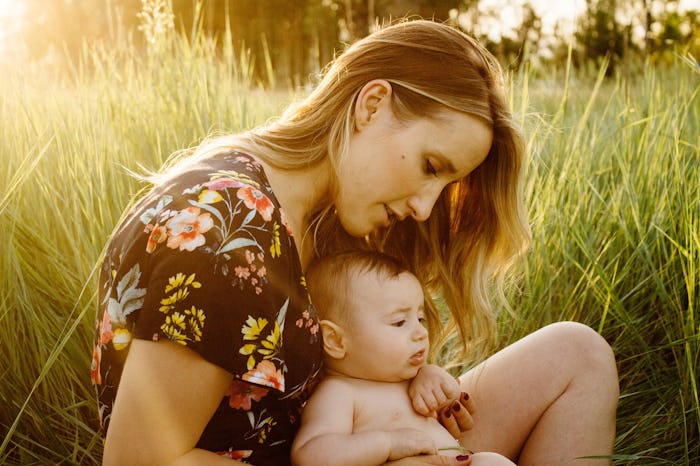Life
This New Study Shows The Lack Of Support Moms Get Isn't Just Sad, It's Dangerous
There's no doubt pregnancy and first-time motherhood are seriously overwhelming. When new moms don't get emotional support, a massive study out of Norway has found that there were severe impacts to their health. The study findings were bleak for new moms, revealing their self-esteem plummets in the transition to motherhood. As if being a new mom wasn't hard enough — the learning curve is pretty steep, let's be honest — this study claims new moms experience a decrease in self-esteem during pregnancy that then gets a boost after birth until an infant is about 6 months old, then decreases steadily until the child turns 3 years old. Oof.
The study will appear in the Journal of Personality and Social Psychology. Researchers surveyed 83,000 moms in Norway and not only looked at first-time moms, but second-, third-, and fourth-time moms as well. They saw a number of similar trends across each group of moms. As much as self-esteem may have decreased during pregnancy for these women, relationship satisfaction held steady. But once baby was born, relationship satisfaction took a nose dive.
While the study paints a much darker picture than the charming illusion of new motherhood many moms have been led to believe, not all hope is lost.
One of the biggest limitations of the study is where it was conducted. Motherhood in Norway is a vastly different experience than American motherhood, simply because as a country, Norway has far more parent-friendly social policies. Save the Children ranked Norway as the best country for mothers in the world in 2015, a position it has held since 2011. U.S. News & World Report, meanwhile, ranked Norway as the fifth best country to be a mother in May. Norwegians receive 46 weeks of paid leave for the birth of a child, while in the United States there is no federal paid parental leave policy at all.
Even though societal norms around motherhood may be more supportive in Norway, the implications of the study's findings show the transition into motherhood is universally challenging — even in a place as supportive as Norway. But why is that?
Corinne Laird, a psychotherapist and Columbia University professor not affiliated with the Norwegian study, offered an explanation as to why the transition into motherhood can be so emotionally fraught for reasons beyond the mere hormones and physical demands of the role. Speaking to Rewire, Laird said:
When someone experiences a significant shift in identity, such as becoming someone’s mother, the psyche has to adjust. Simply because someone is a mother doesn’t mean that they always identify as a mother. This means that the rest of the world has already shifted their perception of who you are before you’ve had a chance to catch up. It’s disorienting.
The result? A massive drop in self-esteem. That's what makes emotional support services for moms such a vital necessity, and not just within the first year of a child's life, as the study indicated. Early childhood is an intensely challenging time for both children and their parents — and, according to this new study, even more for moms as they grapple with the dual roles of taking care of their children and themselves. Emotional support services are more than just joining a local moms group — this is about having licensed mental health professionals working in tandem with OB-GYNs and primary care doctors when a women becomes a mom, Laird said.
While it's easy to write off this study as yet another example of "if mom's not happy, ain't nobody happy" — there is a fundamental truth to the saying. Ultimately, if moms want to be the best parent they can be for the sake of their children, then society needs to ensure it's doing everything it can to support new moms.
